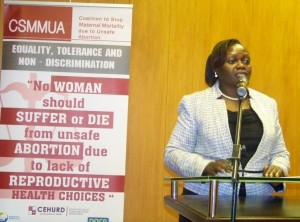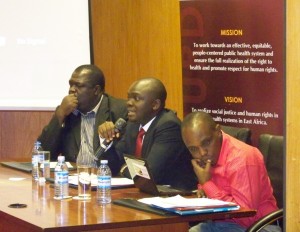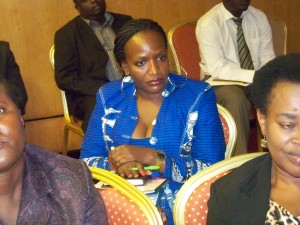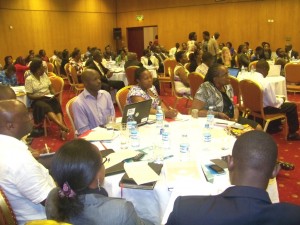 A new study conducted by Aparna Sundaram of the Guttmacher Institute and others, “Documenting the Individual and Household-Level Cost of Unsafe Abortion in Uganda,” indicated that Unsafe abortion often takes a considerable financial toll on Ugandan women and their families, resulting in a decline in economic stability and household well-being. Out of the women surveyed, 73% reported that they had lost wages, 60% their children had less to eat, were unable to attend school or both, and 34% experienced a decline in the economic stability of their household. The study furthers shows that on average, Ugandan women paid 59,600 (US$23) shillings for their abortion procedure.
A new study conducted by Aparna Sundaram of the Guttmacher Institute and others, “Documenting the Individual and Household-Level Cost of Unsafe Abortion in Uganda,” indicated that Unsafe abortion often takes a considerable financial toll on Ugandan women and their families, resulting in a decline in economic stability and household well-being. Out of the women surveyed, 73% reported that they had lost wages, 60% their children had less to eat, were unable to attend school or both, and 34% experienced a decline in the economic stability of their household. The study furthers shows that on average, Ugandan women paid 59,600 (US$23) shillings for their abortion procedure.
Abortion is restricted in Uganda, but not prohibited as it is permitted to save the life and preserve the health of the pregnant woman, including the mental health. However, stigma, discrimination and misinformation mean most women in need of services as well as health care providers do not have correct information about the legal and environment.
The Center for Health Human Rights and Development in collaboration with the Ministry of Health held a national meeting on February 17 2014 to share data and research about the impact of unsafe abortion in Uganda, increase awareness about the legal and policy framework in Uganda, recruit additional public champions in the struggle to reduce maternal mortality due to unsafe abortion, and finally to agree on prevention interventions all partners; legal, service providers, government, religious leaders, among others can take to reduce maternal mortality due to unsafe abortion.
collaboration with the Ministry of Health held a national meeting on February 17 2014 to share data and research about the impact of unsafe abortion in Uganda, increase awareness about the legal and policy framework in Uganda, recruit additional public champions in the struggle to reduce maternal mortality due to unsafe abortion, and finally to agree on prevention interventions all partners; legal, service providers, government, religious leaders, among others can take to reduce maternal mortality due to unsafe abortion.
 The meeting was attended by Hon. Minister of state for health in charge of primary health care Sarah Opendi, others officials from the Ministry of Health and Ministry of Justice, Members of Parliament, Professional medical bodies, professional health workers, and community based organizations, religious leaders, cultural leaders, legal organizations, human rights organizations, and academics.
The meeting was attended by Hon. Minister of state for health in charge of primary health care Sarah Opendi, others officials from the Ministry of Health and Ministry of Justice, Members of Parliament, Professional medical bodies, professional health workers, and community based organizations, religious leaders, cultural leaders, legal organizations, human rights organizations, and academics.
According to the executive director of the Center for Health, Human Rights and Development, Mr. Moses Mulumba, these findings make clear that more must be done to reduce unintended pregnancy by ensuring that Ugandan women have access to family planning services. Mr Mulumba, added that, accurate information on contraception and high-quality services must be made available as a matter of constitutionally guaranteed rights to allow women to avoid an unwanted pregnancy. Young and poor women in particular need access to these services.
Hon. Sarah Opendi was concerned by the fact that abortion is third on the list of major killers of pregnant mothers after haemorrhage and infections. She added that, there are lots of media reports about girls carrying out abortions leaving a question of what happens to men who impregnate these girls. Hon. Opendi also said, reducing maternal mortality is very important as this is also well reflected in the millennium development goals (MDG 5).
 By the end of the meeting, participants had agreed that it is important to have a well-defined legal framework on abortion, to have research findings taken back to communities for members of the communities to know exactly how the situation is, Ministry of Health to get legal assistance from members of parliament on how to go about the existing guidelines, to increase sensitization of the existing guidelines on safe abortion, and to have the unmet need of contraception reduced
By the end of the meeting, participants had agreed that it is important to have a well-defined legal framework on abortion, to have research findings taken back to communities for members of the communities to know exactly how the situation is, Ministry of Health to get legal assistance from members of parliament on how to go about the existing guidelines, to increase sensitization of the existing guidelines on safe abortion, and to have the unmet need of contraception reduced

